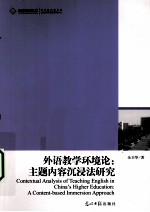图书介绍
外语教学环境论 主题内容沉浸法研究PDF|Epub|txt|kindle电子书版本网盘下载

- 余卫华著 著
- 出版社: 北京:光明日报出版社
- ISBN:9787511207302
- 出版时间:2010
- 标注页数:297页
- 文件大小:13MB
- 文件页数:314页
- 主题词:外语教学-教学研究-中国
PDF下载
下载说明
外语教学环境论 主题内容沉浸法研究PDF格式电子书版下载
下载的文件为RAR压缩包。需要使用解压软件进行解压得到PDF格式图书。建议使用BT下载工具Free Download Manager进行下载,简称FDM(免费,没有广告,支持多平台)。本站资源全部打包为BT种子。所以需要使用专业的BT下载软件进行下载。如BitComet qBittorrent uTorrent等BT下载工具。迅雷目前由于本站不是热门资源。不推荐使用!后期资源热门了。安装了迅雷也可以迅雷进行下载!
(文件页数 要大于 标注页数,上中下等多册电子书除外)
注意:本站所有压缩包均有解压码: 点击下载压缩包解压工具
图书目录
Chapter One Introduction1
1.1 The background of the study1
1.2 The research questions4
1.3 Composition of the thesis6
Chapter Two Analysis of the Literature on EFL Methodology9
2.1 Introduction9
2.2 Foreign language education:a global overview10
2.2.1 Clarification of concepts10
2.2.2 Historical development11
2.2.3 Implications15
2.3 Bilingualism and bilingual education16
2.3.1 Introduction16
2.3.2 Bilingualism and bilingual competence17
2.3.2.1 Definition of bilingualism17
2.3.2.2.Bilingual competence18
2.3.3 Bilingual education22
2.4 Immersion25
2.4.1 Historical development25
2.4.2 The prototype models and the essential features28
2.4.3 Evaluations30
2.5 Content-based instruction33
2.5.1 Clarification of concepts33
2.5.2 Prototype models34
2.5.3 Rationales and evaluations37
2.6.Needs analysis44
2.6.1 Clarification of concepts44
2.6.2 Key models and data collection procedures47
2.6.3 Evaluations49
2.7 Conclusions51
2.7.1 A summary of the chapter51
2.7.2 Theoretical foundations53
2.7.3 A proposed integrated EFL teaching approach54
Chapter Three The Contextual Setting:EFL Education in China57
3.1 Introduction57
3.2 Historical overview before 194958
3.3 Recent developments since 194963
3.4 Present situation68
3.5 Existing problems and a tentative solution73
3.5.1 Existing problems73
3.5.2 A possible solution76
3.6 A summary of the chapter80
Chapter Four The Research Methodology82
4.1 Introduction82
4.2 Research origins83
4.3 Qualitative v.s.quantitative research86
4.4 The research interview88
4.5 Criteria of assessing qualitative research91
4.6 Data collection procedures96
4.6.1 Interview schedules97
4.6.2 Pilot phase100
4.6.3 The research sample103
4.6.4 Weaknesses of the procedures106
4.7 Ethical issues107
4.7.1 Informed consent107
4.7.2 Trust and confidentiality108
4.7.3 Reciprocity109
4.8 A summary of the chapter110
Chapter Five Data Analysis and Interpretation111
5.1 Introduction111
5.2 The methods and the process of data analysis113
5.2.1 The methods of analysis113
5.2.2 The process of the data analysis117
5.3 EFL learning122
5.3.1 Introduction122
5.3.2 EFL learning goals123
5.3.3 EFL learning difficulties128
5.3.4 EFL learning theories140
5.4 Academic learning148
5.5 Content-based EFL immersion168
5.5.1 Existing problems in China's EFL education168
5.5.2 Feasibility and implementation of the proposed EFL teaching approach173
5.5.2.1 Teaching qualifications177
5.5.2.2 Co-operation between language and content teachers181
5.5.2.3 Curriculum planning183
5.5.2.4 Late immersion187
5.5.2.5 Partial Immersion189
5.5.2.6 Transformation of conservative educational values192
5.6 A summary of the chapter194
Chapter Six Implications and Considerations197
6.1 Introduction197
6.2 Implications from the data198
6.2.1 Ensure sufficient exposure to and create environments for using the target language198
6.2.2 Develop students' intrinsic motivation through classroom EFL teaching201
6.2.3 Adapt the advantages of anglophone teaching and learning styles into China's higher education202
6.2.4 Preserve the advantages of the traditional Chinese learning styles206
6.2.5 Trial and implement the content-based immersion approach208
6.3 Considerations for implementation and trialling211
6.3.1 Students' English proficiency levels212
6.3.2 Curriculum planning214
6 3 3 Assessments and evaluations217
6.3.4 Pedagogy and cooperation between content and language teachers219
6.3.5 Approval and support from educational administration224
6.4 A summary of the chapter226
Chapter Seven Conclusions227
7.1 Introduction227
7.2 A general summary of the study227
7.3 Limitations of the study231
7.4 Future research235
7.5 A summary of the chapter239
Bibliography240
Appendix Ⅰ A Pre-interview or Pre-reply Letter263
Appendix Ⅱ Questions and Triggers(for Interviews and Email Replies)265
Appendix Ⅲ A Sample Email Reply269
Appendix Ⅳ A Sample Interview Transcript277
Appendix Ⅴ Sample Interview Transcript Two285
Index293